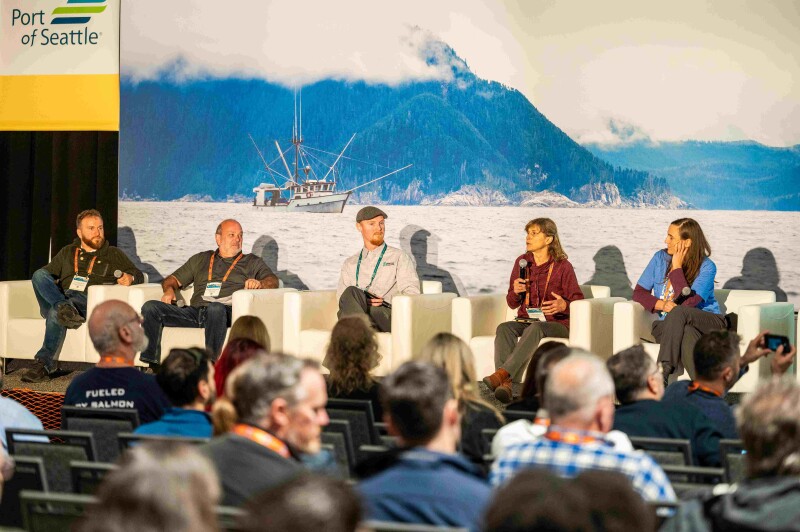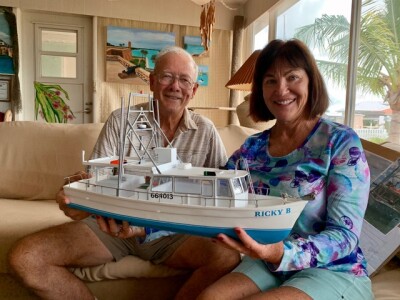As the Pacific Marine Expo (PME) approaches in just a few weeks, discussions surrounding critical agency programmatic and legislative support for the fishing and seafood industries are heating up. A notable focus this year is support for seafood and fishing businesses at the USDA, which offers a unique opportunity for the fishing and seafood sectors to secure much-needed support alongside traditional agriculture.
The United States Department of Agriculture (USDA) issues around $130 billion in the Farm Credit Program loans each year and it issued $3.4 billion in young farmer and rancher loans alone last year. Assuming that the seafood and fishing industries are around 10% of the overall food producer economy in the U.S., there’s a massive amount of low-cost capital that could suddenly become available.
In a recent interview, Noah Oppenheim, principal of Homarus Strategies, shared insights about the Farm Bill framework unveiled by Senate Agriculture, Nutrition, and Forestry Committee Ranking Member John Boozman. This framework contains pivotal provisions designed to benefit fishing communities and address the many challenges they face.
“The seafood provisions in this framework will go a long way toward helping our communities rebuild after catastrophic storm losses and ensuring a future for our working waterfronts,” Oppenheim explained. He highlighted the pressing need for policy changes that recognize the fishing industry as a crucial component of the broader food system. “Like their terrestrial agriculture counterparts, seafood producers need support in order to thrive in today’s economy,” he stressed.
The Senate Republican Farm Bill framework’s provisions include establishing a seafood liaison within the USDA Office of Chief Economist, requiring Country of Origin Labeling (COOL) for certain processed crab and salmon products, Buy American provisions for USDA food purchases that include seafood, support for cold chain infrastructure, directing the USDA to conduct a study on expanding seafood processing in coastal communities, and low-cost Farm Credit program eligibility for seafood and fishing businesses. These elements reflect a significant shift in recognizing the fishing sector's economic and cultural importance.
Oppenheim pointed out that “fishing communities across the country are facing infrastructure losses, market threats, difficult capital environments, and many other hallmarks of an under-supported industry in America.” The challenges are daunting, yet the proposed framework represents a step toward creating a more equitable support structure for seafood producers, akin to the support that has long been available to farmers.
As PME draws near, the conversation will take a deep dive into how USDA programs for seafood and fishing businesses, as well as their terrestrial agriculture counterparts, support food producers. Oppenheim emphasized that the USDA is not just about financial assistance; it's about creating an environment where fishing businesses can thrive. “There’s a lot of additional organizing in the industry side, and a great deal of work in Congress, which is very slow and politically challenging,” he noted, underscoring the need for ongoing advocacy and engagement from industry stakeholders.
Oppenheim is moderating a PME panel session that will serve as a platform for dialogue among fishermen, seafood business owners, and experts about the future of seafood in the U.S. The conversation will cover existing and potential new opportunities to shift support for seafood and fishing businesses’ fiscal and marketing needs over to an agency that has been helping food producers thrive for generations. As Oppenheim succinctly put it, “We need to see more voices in this conversation to ensure that seafood producers are prioritized at the USDA.”
The policy landscape is evolving, and as fishing communities work alongside lawmakers, there is a collective hope that the upcoming Farm Bill will bring comprehensive support for the fishing industry. Oppenheim remains optimistic about the potential impact of these discussions at PME: “This is an opportunity for our industry to come together, share our stories, learn about opportunities, and advocate for the support we need.”
The stakes are high, as Oppenheim reiterated the broader implications of the Farm Bill on food security and local economies. “Our community-based fishing fleets open doors to domestic food security, maritime careers, and thriving working waterfronts,” he stated, capturing the essence of what is at risk if the fishing industry remains under-supported.
PME is poised to be a pivotal event for the fishing community as it grapples with pressing challenges and explores new avenues for support at the USDA. The discussions led by figures like Oppenheim and our expert panelists are crucial for building momentum and ensuring that the voices of fishermen and seafood producers are heard in the corridors of power. As new opportunities for supporting seafood and fishing businesses advance, it is essential for stakeholders to rally together and advocate for the future of fishing in America.







